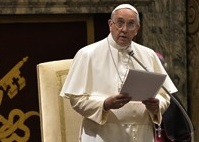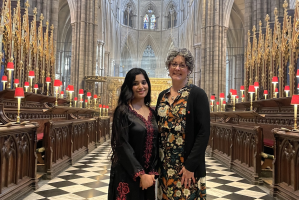Pope highlights impact of unemployment on families

Pope Francis today (Saturday) highlighted the serious problem of unemployment. His words came during a meeting with participants attending an International Conference of the Centesimus Annus Pro Pontifice Foundation which has been taking place in Rome this week.
The Centesimus Annus Pro Pontifice Foundation is a lay-led non-profit-organisation whose purpose it is to promote Catholic Social Doctrine. And is was on Saturday that Pope Francis met with those attending an international conference in the Vatican where he highlighted the fight against poverty and what he called the “grave problem” of unemployment.
In his address the Holy Father commended the foundation for their 2017 statement which notes “that the fight against poverty demands a better understanding of the reality of poverty as a human and not merely an economic phenomenon.
He also highlighted that “promoting integral human development demands dialogue and engagement with people’s needs and aspirations, listening to the poor and their daily experience of “multidimensional, overlapping deprivations”, and devising specific responses to concrete situations.
The Pope said that what was needed was community and business enterprises where the poor “are the principal actors and beneficiaries.”
Another issue which was highlighted by Pope Francis was that of unemployment noting that the conference had paid particular attention to the critical issue of job creation in the context of the ongoing new technological revolution.
How can we not be concerned, the Pope said, “about the grave problem of unemployment among the young and among adults that have not the means to “upgrade” themselves? It is a problem, he added, “that has reached truly dramatic proportions in both developed and developing countries, and needs to be addressed, not least out of a sense of intergenerational justice and responsibility for the future.”
The Holy Father also recalled that the effects of unemployment on families was a concern expressed by the recent Synod assemblies on the family, which noted, “that uncertainty about work situations often contributes to family pressures and problems, and has an effect on the family’s ability to participate fruitfully in the life of society.”
Concluding his discourse the Pope encouraged the Foundation to bring the light of the Gospel and “the richness of the Church’s social teaching to these pressing issues by contributing to informed discussion, dialogue and research, but also by committing themselves for that change of attitudes, opinions and lifestyles which is essential for building a world of greater justice, freedom and harmony.”
The English language translation of the Pope's address to the 'Centesimus Annus Pro Pontifice' Foundation follows:
20 May 2017
Dear Friends,
I offer you a warm welcome on the occasion of the International Conference of the Centesimus Annus Pro Pontifice Foundation. I thank your President, Mr Domingo Sugranyes Bickel, for his kind greeting in your name. I express my appreciation for your efforts to seek other ways of understanding the economy and progress, and business, to meet the ethical challenges posed by the imposition of new paradigms and forms of power derived from technology, the throwaway culture and lifestyles that ignore the poor and despise the weak (cf. Enc. Laudato Si’, 16).
Many people are struggling to bring the whole human family together to seek a sustainable and integral development, for we know that things can change (cf. ibid, 13). Your Foundation is also making a valuable contribution precisely by approaching business and finances both in the light of the rich heritage of the Church’s social doctrine and the intelligent search for “constructive alternatives”. Drawing on your own expertise and experience, and in cooperation with other people of good will, you are committed to developing models of economic growth centred on the dignity, freedom and creativity that are the hallmark of the human person.
Your Foundation’s 2017 Statement rightly notes that the fight against poverty demands a better understanding of the reality of poverty as a human and not merely economic phenomenon. Promoting integral human development demands dialogue and engagement with people’s needs and aspirations, listening to the poor and their daily experience of “multidimensional, overlapping deprivations”, and devising specific responses to concrete situations. This calls for the creation, within communities and between communities and business, of mediating structures capable of bringing people and resources together, initiating processes in which the poor are the principal actors and beneficiaries. Such a person-based approach to economic activity will encourage initiative and creativity, the entrepreneurial spirit and communities of labour and enterprise, and thus favour social inclusion and the growth of a culture of effective solidarity.
In these days, you have paid particular attention to the critical issue of job creation in the context of the ongoing new technological revolution. How can we not be concerned about the grave problem of unemployment among the young and among adults that have not the means to “upgrade” themselves? It is a problem that has reached truly dramatic proportions in both developed and developing countries, and needs to be addressed, not least out of a sense of intergenerational justice and responsibility for the future. In a similar way, efforts to address the complex of issues associated with the growth of new technologies, the transformation of markets and the legitimate aspirations of the workforce must take into account not only individuals but families as well. This, as you know, was a concern expressed by the recent Synod assemblies on the family, which noted that uncertainty about work situations often contributes to family pressures and problems, and has an effect on the family’s ability to participate fruitfully in the life of society (cf. Ap. Exhort. postsin. Amoris Laetitia, 44).
Dear friends, I encourage your efforts to bring the light of the Gospel and the richness of the Church’s social teaching to these pressing issues by contributing to informed discussion, dialogue and research, but also by committing yourselves for that change of attitudes, opinions and lifestyles which is essential for building a world of greater justice, freedom and harmony.
In offering my prayerful good wishes for the fruitfulness of your work, I cordially invoke upon you, your families and your associates God’s blessings of joy and peace.

















